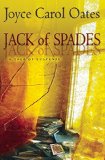Summary | Excerpt | Reviews | Beyond the book | Read-Alikes | Genres & Themes | Author Bio

A Tale of Suspense
by Joyce Carol OatesReading (enjoying) Oates' outstanding first person story about a famous author's descent into madness made me wonder if there is such a thing as a bildungsroman for alter egos. A kind of coming of age tale about a person's internal demon that spends a lifetime as a (mostly) harmless, toothless, nascent being that suddenly blossoms into full adulthood. What a delicious – to us horror fans – idea. I wish I had thought of it. Thankfully I didn't have to. Oates thought of it first. And Jack of Spades is wonderful. Understated, but infinitely more powerful for it.
Oates' protagonist, Andrew J Rush, is a bestselling author of "serious and uplifting" mystery-suspense novels that are never mean or disturbing or sexist or politically incorrect in any way, shape or form. He's been described as "the gentleman's Stephen King." A comparison that grates on him no end, partly because he enjoys nowhere near the status – literarily or monetarily – of King; partly because Andrew harbors a jealous alter ego that continually elbows him in the ribs. This second self seems to exist for two reasons. First, to write novels that Andrew would never dare. Under the professional pseudonym, Jack of Spades, Andrew publishes lurid, macabre "macho-sadist trash" novels that are written by hand, on yellow legal pads at a special small antique table tucked in a corner of Andrew's office.
Oates sketches Andrew-as-Jack in the sparest of styles, which inspires my imagination. I see him pulled into a tight ball, feet tucked under him, sitting on a hard wooden chair. His crablike hand clutches a cheap Bic pen. He is scratching out heinous scenes of hideous mayhem in the middle of the night under the 60-watt glare of a single old-fashioned desk lamp while sipping single malt. All in view, but out of reach, of the expansive mahogany desk of beloved author Andrew J Rush, whose books unfold on a high-end desktop computer.
Andrew maintains an obsessively tight rein on any connection between himself and Jack of Spades. No one, not Andrew's wife Irina, nor his editor or agent knows of the connection. There is an anonymous postal box, double bank accounts and a secret hidden stash of Jack of Spades manuscripts, galleys and first editions. It is Andrew's way of remaining in control. Evil may exist but he will keep it separate. Until his daughter finds and reads one of the Jack of Spades books. Suddenly he is disquieted, fearful. "I had the feeling that something further would happen, out of my control. If there is one thing that frightens me, that infuriates me, it is losing control."
Then the tipping point occurs, from which there is no turning back. A local, elderly woman – an unpublished author – brings a frivolous lawsuit against Andrew for plagiarism. Now his emotional state escalates. He's suspicious and angry. After the case is dismissed and the woman suffers a breakdown he feels strangely sympathetic and more than a little guilty. "It had not been my fault…but I could well understand how years of frustration, fury, and failure could drive an aspiring writer to madness and breakdown." And this is where the second purpose Jack of Spades exists becomes clear. (Remember the first? To write novels that Andrew would never dare?) Jack of Spades is also there to prevent Andrew from feeling overly content with his lovely life – his not inconsiderable literary success, financial security, beautiful home, devoted wife Irena, and three grown, independent children.
From the beginning, it is clear that Andrew J Rush – as he frequently refers to himself, distinguishing the author from Andy, the husband, father, person – feels he is a fraud. His success feels arbitrary, his writing sub par compared to what Irina is capable of and who forsook her writing career in deference to his. But there is more; a deep-seated guilt over something that doesn't come to light until later. Drinking, cruelty, paranoia, and suspicion slowly overtake Andrew as Jack of Spades begins his ascendancy.
And in one magnificent sentence, with the slightest change of syntax, Oates creates an explosive climax that clearly, shockingly renders Andrew's change. It would spoil the novel to tell more, but suffice it to say that the scene is graphic, yes, but starkly so, not lurid. This is what makes Jack of Spades so absorbing. The author has trimmed away everything but the barest bones and left me with the most frightening of monsters – my own imagination.
![]() This review was originally published in The BookBrowse Review in July 2015, and has been updated for the
May 2016 edition.
Click here to go to this issue.
This review was originally published in The BookBrowse Review in July 2015, and has been updated for the
May 2016 edition.
Click here to go to this issue.

If you liked Jack of Spades, try these:

by Harlan Coben
Published 2006
A twisting, turning, emotionally charged story, and a compelling tale of the choices we make and the repercussions that never leave us.

by Ian Caldwell, Dustin Thomason
Published 2005
An ivy league murder, a mysterious coded manuscript and the secrets of a Renaissance prince collide memorably in this debut novel, that weaves together suspense and scholarship, high art and unimaginable treachery.
What really knocks me out is a book that, when you're all done reading, you wish the author that wrote it was a ...
Click Here to find out who said this, as well as discovering other famous literary quotes!
Your guide toexceptional books
BookBrowse seeks out and recommends the best in contemporary fiction and nonfiction—books that not only engage and entertain but also deepen our understanding of ourselves and the world around us.